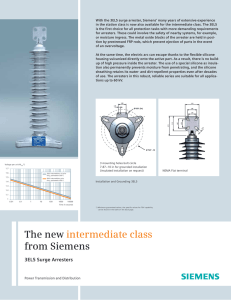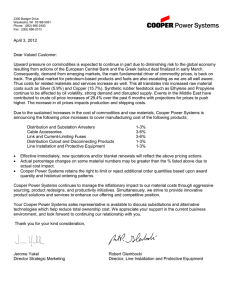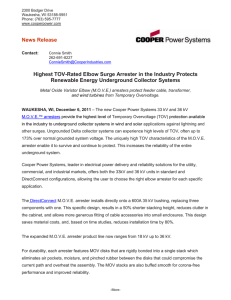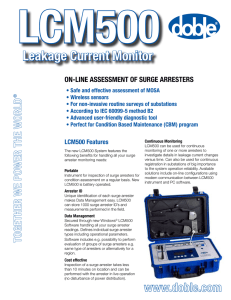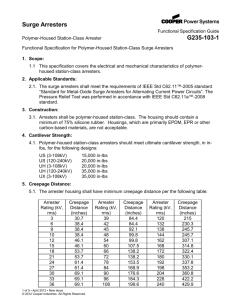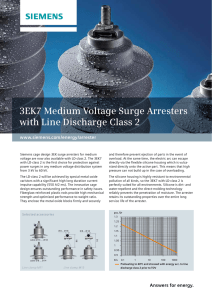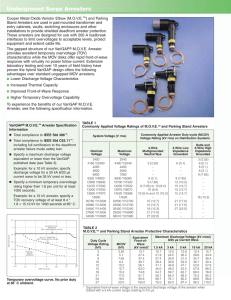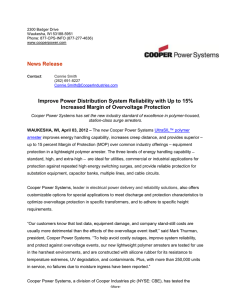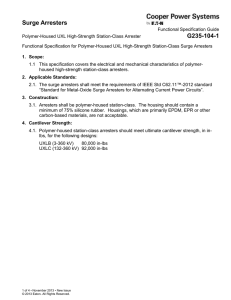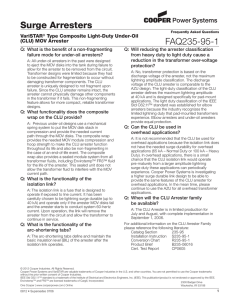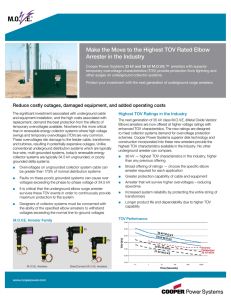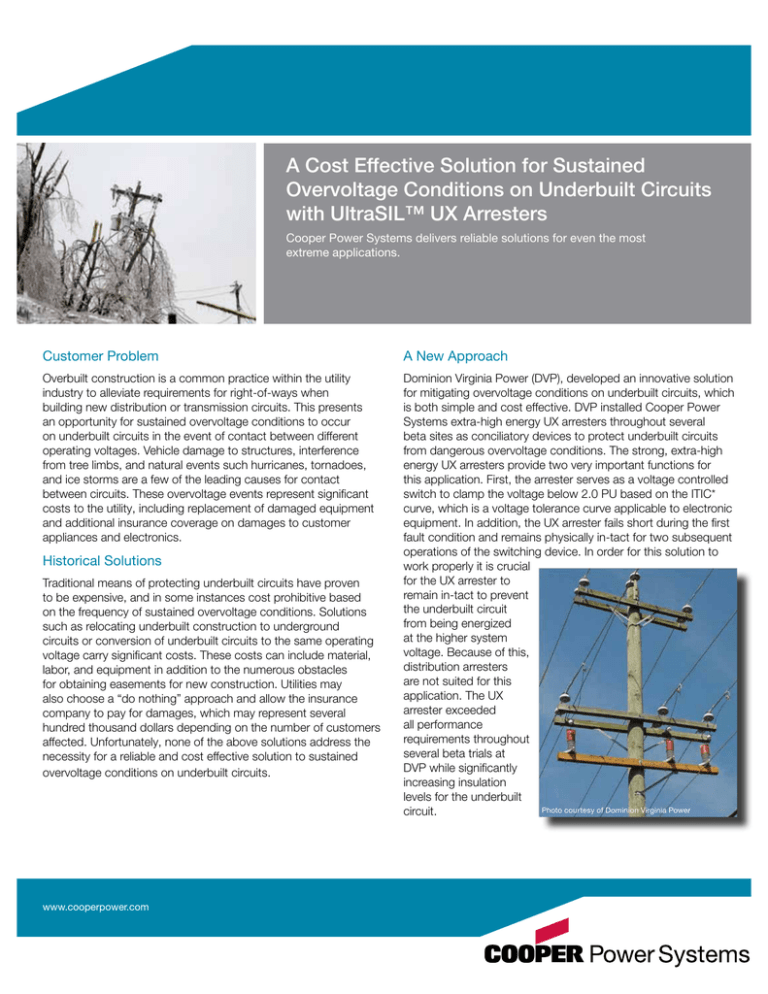
A Cost Effective Solution for Sustained
Overvoltage Conditions on Underbuilt Circuits
with UltraSIL™ UX Arresters
Cooper Power Systems delivers reliable solutions for even the most
extreme applications.
Customer Problem
A New Approach
Overbuilt construction is a common practice within the utility
industry to alleviate requirements for right-of-ways when
building new distribution or transmission circuits. This presents
an opportunity for sustained overvoltage conditions to occur
on underbuilt circuits in the event of contact between different
operating voltages. Vehicle damage to structures, interference
from tree limbs, and natural events such hurricanes, tornadoes,
and ice storms are a few of the leading causes for contact
between circuits. These overvoltage events represent significant
costs to the utility, including replacement of damaged equipment
and additional insurance coverage on damages to customer
appliances and electronics.
Dominion Virginia Power (DVP), developed an innovative solution
for mitigating overvoltage conditions on underbuilt circuits, which
is both simple and cost effective. DVP installed Cooper Power
Systems extra-high energy UX arresters throughout several
beta sites as conciliatory devices to protect underbuilt circuits
from dangerous overvoltage conditions. The strong, extra-high
energy UX arresters provide two very important functions for
this application. First, the arrester serves as a voltage controlled
switch to clamp the voltage below 2.0 PU based on the ITIC*
curve, which is a voltage tolerance curve applicable to electronic
equipment. In addition, the UX arrester fails short during the first
fault condition and remains physically in-tact for two subsequent
operations of the switching device. In order for this solution to
work properly it is crucial
for the UX arrester to
remain in-tact to prevent
the underbuilt circuit
from being energized
at the higher system
voltage. Because of this,
distribution arresters
are not suited for this
application. The UX
arrester exceeded
all performance
requirements throughout
several beta trials at
DVP while significantly
increasing insulation
levels for the underbuilt
Photo courtesy of Dominion Virginia Power
circuit.
Historical Solutions
Traditional means of protecting underbuilt circuits have proven
to be expensive, and in some instances cost prohibitive based
on the frequency of sustained overvoltage conditions. Solutions
such as relocating underbuilt construction to underground
circuits or conversion of underbuilt circuits to the same operating
voltage carry significant costs. These costs can include material,
labor, and equipment in addition to the numerous obstacles
for obtaining easements for new construction. Utilities may
also choose a “do nothing” approach and allow the insurance
company to pay for damages, which may represent several
hundred thousand dollars depending on the number of customers
affected. Unfortunately, none of the above solutions address the
necessity for a reliable and cost effective solution to sustained
overvoltage conditions on underbuilt circuits.
www.cooperpower.com
UltraSIL™ Polymer-Housed
Station-Class Surge Arresters
Protection you can count on
Progressive Products
Installation Considerations
Capable of withstanding severe electrical-mechanical
conditions, and uniquely suited for the demands of distribution
underbuilt applications, our polymer UltraSIL-housed, extrahigh energy UX station-class arrester incorporates a patented
manufacturing process. This process utilizes revolutionary high
strength composite matrix insulating materials to encapsulate
the arrester’s internal components. The primary function of the
composite matrix to provide structural integrity for the arrester in
the event of failure.
Special considerations must be given for prevention of external
flashovers of the arrester due to interference from wildlife or
contact with tree branches. Aftermarket wildlife protectors are
available to insulate the line connection to the arrester.
Station-class arresters are not designed with Ground-LeadDisconnects (GLDs) so Faulted Circuit Indicator’s (FCIs) may be
used to help locate failed UltraSIL station arresters if required.
Additional Information
To learn even more about underbuilt arresters and arrester
applications, please see the articles listed below.
Cooper Power Systems has established rigorous dielectric
testing, which surpasses even the most severe tests required
by the IEEE C62.11™-2005 design standard, including a
short-circuit rating of 65 kA. In addition, our UX design has
demonstrated the capability of withstanding three separate shortcircuit conditions in excess of 6 kA or greater for time durations
up to 0.8 seconds during several beta trials at Dominion Virginia
Power. Enhanced durability and reliability reinforce the extra-high
energy UX station-class arrester as the product of choice for
overbuilt applications.
■■
The Underbuilt Line Arrester1, http://www.arresterworks.
com/arresterfacts/pdf_files/underbuilt_line_arrester.pdf
■■
When Overbuild
Meets Underbuild2:
http://tdworld.com/
overhead_distribution/
surge-arrestors-solveovervoltage-20110301/
index.html
UltraSIL™ UX Arrester
Completion of Bending Moment Test per IEEE C62.11 design standard
*Information Technology Industry Council (ITIC)
1
ArresterWorks.com, May 11, 2009, By Jonathon Woodworth, Consulting Engineer Arrester Works
2
Transmission and Distribution World, Mar 1, 2011, By Daniel J. Ward, Dominion Virginia Power
IEEE Std C62.11™ Standard is a trademark of the Institute of Electrical and Electronics Engineers, Inc., (IEEE).
Contact your local Cooper Power Systems representative
for further assistance sizing UltraSIL UX extra-high energy
polymer station arresters, and additional guidelines for optimum
placement of arresters to protect the underbuilt circuit.
Cooper Power Systems
2300 Badger Drive
Waukesha, WI 53188
P: 877.CPS.INFO
www.cooperpower.com
B235-12083 1012
Cooper Power Systems and UltraSIL are valuable trademarks of Cooper Industries in the U.S. and other countries.
You are not permitted to use the Cooper Trademarks without the prior written consent of Cooper Industries.
©2011 Cooper Industries. All Rights Reserved.

